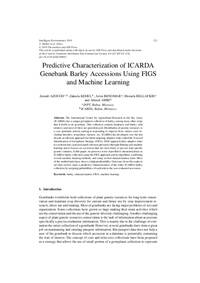Predictive Characterization of ICARDA Genebank Barley Accessions sing FIGS and Machine Learning

Authors:
The International Center for Agricultural Research in the Dry Areas (ICARDA) has a unique germplasm collection of barley, among many other crops that it holds in its genebank. This collection contains landraces and barley wild relatives and most of them are georeferenced. Distribution of genetic resources is a core genebank activity aiming at responding to requests from various users including breeders, researchers, farmers, etc. ICARDA has developed over the last decade an efficient approach for better targeting adaptive traits called the Focused Identification of Germplasm Strategy (FIGS). FIGS approach links adaptive traits to environments (and associated selection pressures) through filtering and machine learning and it focuses on accessions that are most likely to possess trait specific genetic variation. In this paper, we present a work of predictive characterization on ICARDA barley collection using the FIGS approach and its algorithms combining several machine learning methods, and using several characterization traits. Most of the studied traits have shown a high predictability. Outcomes from this analysis are then used to make a predictive characterization of the entire ICARDA barley collection by assigning probabilities of each trait to the non-evaluated accessions.
